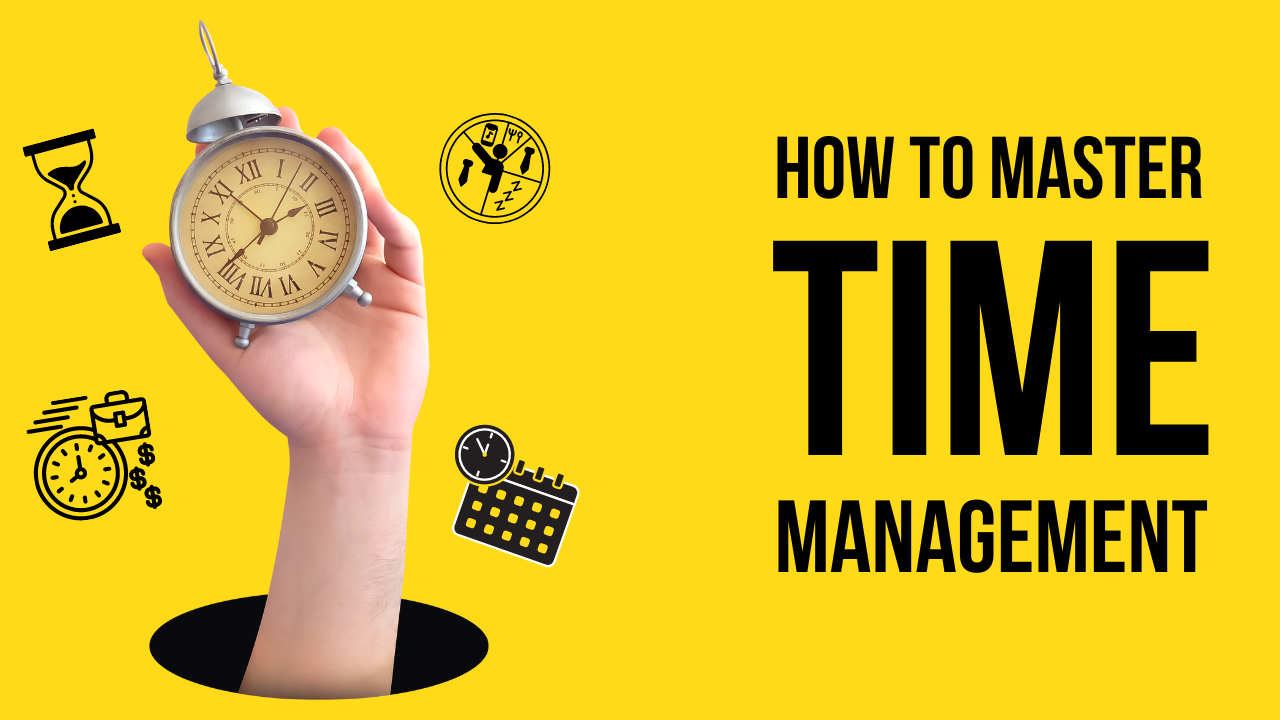Effective time management techniques, such as setting priorities and creating a daily schedule, can significantly boost productivity at work. By implementing strategies like avoiding multitasking and setting specific goals, individuals can maximize their efficiency and achieve better results in less time.
Time management is a crucial skill for success in the workplace. It helps individuals stay organized, focused, and motivated throughout the day. We will explore various time management techniques that can help you make the most of your workday and enhance your overall productivity.
Mastering these techniques will not only improve your performance but also reduce stress and increase job satisfaction. Let’s delve into the world of effective time management and unleash your full potential at work.
The Importance Of Time Management
Effective time management is crucial for boosting productivity at work. By understanding the value of time and the impact of poor time management, individuals can achieve greater efficiency and effectiveness in their daily tasks and responsibilities.
Understanding The Value Of Time
Time is a precious resource, and managing it effectively is key to achieving success in the professional sphere. When time is managed well, individuals can allocate their efforts towards high-priority tasks, leading to improved productivity and greater job satisfaction.
The Impact Of Poor Time Management
Poor time management can have detrimental effects on an individual’s work performance. Missed deadlines, lack of focus, and increased stress levels are common outcomes of inadequate time management. This can lead to subpar results and negative perceptions from colleagues and supervisors.
Identifying Time Wasters
Common Distractions In The Workplace
One common distraction is incessant social media checking throughout the workday.
Another distraction is frequent unnecessary meetings that take up valuable time.
Unproductive Habits To Avoid
Multitasking can lead to decreased focus and efficiency
Effective Time Management Techniques
Efficiently managing your time is crucial for maximizing productivity at work. Utilizing effective time management techniques can help you stay focused, meet deadlines, and achieve your goals with ease.
- Identify urgent tasks first.
- Set clear, achievable goals.
- Create a to-do list with priorities.
- Allocate time for each task.
- Set aside time for breaks.
- Stick to your schedule diligently.
- Segment your day into blocks of time.
- Assign specific tasks to each block.
- Avoid multitasking during blocks.

Credit: www.linkedin.com
Overcoming Procrastination
Understanding The Root Causes Of Procrastination
Procrastination is often rooted in fear, perfectionism, or lack of clarity. People may fear failure, judgment, or the unknown, leading to avoidance. Perfectionists may delay starting a task out of fear of not doing it perfectly. Lack of clarity about the task, its importance, or how to proceed can also fuel procrastination.
Proven Strategies To Overcome Procrastination
Setting clear goals and breaking tasks into smaller, manageable steps can combat procrastination. Creating a positive work environment, minimizing distractions, and setting deadlines can instill a sense of urgency and help tackle procrastination. Prioritizing tasks, practicing time-blocking, and using visual reminders can reinforce focus and productivity.
Managing Email And Digital Communications
Learn effective time management techniques for boosting productivity at work by efficiently managing email and digital communications. Develop strategies to minimize distractions and maximize your focus, allowing you to stay organized and accomplish tasks more efficiently.
Managing Email and Digital Communications Email and digital communications have become an integral part of our work routine. While these tools are meant to enhance productivity, they often lead to information overload and a sense of always being “on.” To effectively manage email and digital communications and boost productivity at work, it is crucial to implement strategies to reduce email overload and establish effective communication boundaries.Strategies To Reduce Email Overload
To combat email overload, try implementing the following strategies: 1. Set specific times to check emails: Rather than constantly being interrupted by incoming emails, allocate specific times during the day to check and respond to emails. This way, you can stay focused on your primary tasks without constant distractions. 2. Unsubscribe from unnecessary newsletters: Over time, we tend to accumulate subscriptions to various newsletters and promotional emails that clog our inboxes. Be ruthless in unsubscribing from those that no longer provide value or are not relevant to your work. 3. Use filters and folders to organize emails: Create filters and folders to automatically sort incoming emails based on priority or subject. This allows you to quickly locate important emails and reduces the time spent searching through cluttered inboxes. 4. Limit the use of the “reply all” function: Avoid adding unnecessary recipients when replying to an email. Only include those directly related to the conversation to prevent endless chains of replies and unnecessary notifications for others.Implementing Effective Communication Boundaries
In addition to reducing email overload, it is important to establish boundaries when it comes to digital communication. Consider the following practices: 1. Define response time expectations: Make it clear to colleagues and clients when they can expect a response from you. This helps manage their expectations and ensures you have dedicated blocks of uninterrupted work time. 2. Use alternative communication channels for urgent matters: If a matter requires immediate attention, encourage others to reach out through instant messaging or phone calls instead of relying solely on email. This allows for quicker resolution and prevents important matters from getting buried in overflowing inboxes. 3. Create a work-life balance: Set boundaries between your work and personal life by establishing specific hours when you are available for communication. Avoid checking emails outside of these designated times to prevent burnout and maintain a healthy work-life balance. 4. Train colleagues on effective communication practices: Share your strategies for managing email and digital communications with your colleagues. Encourage them to adopt similar practices to reduce email overload and improve overall productivity. By implementing these strategies and establishing effective communication boundaries, you can regain control over your email and digital communications, minimize distractions, and focus on the important tasks at hand. Take steps towards optimizing your time management techniques and watch your productivity soar.
Credit: fastercapital.com

Credit: www.linkedin.com
Conclusion
Incorporating effective time management techniques is crucial for enhancing productivity at work. By utilizing strategies such as prioritizing tasks, setting clear goals, and minimizing distractions, you can optimize your time and achieve greater efficiency. Implementing these techniques will enable you to work smarter, not harder, and ultimately lead to improved work-life balance and job satisfaction.



